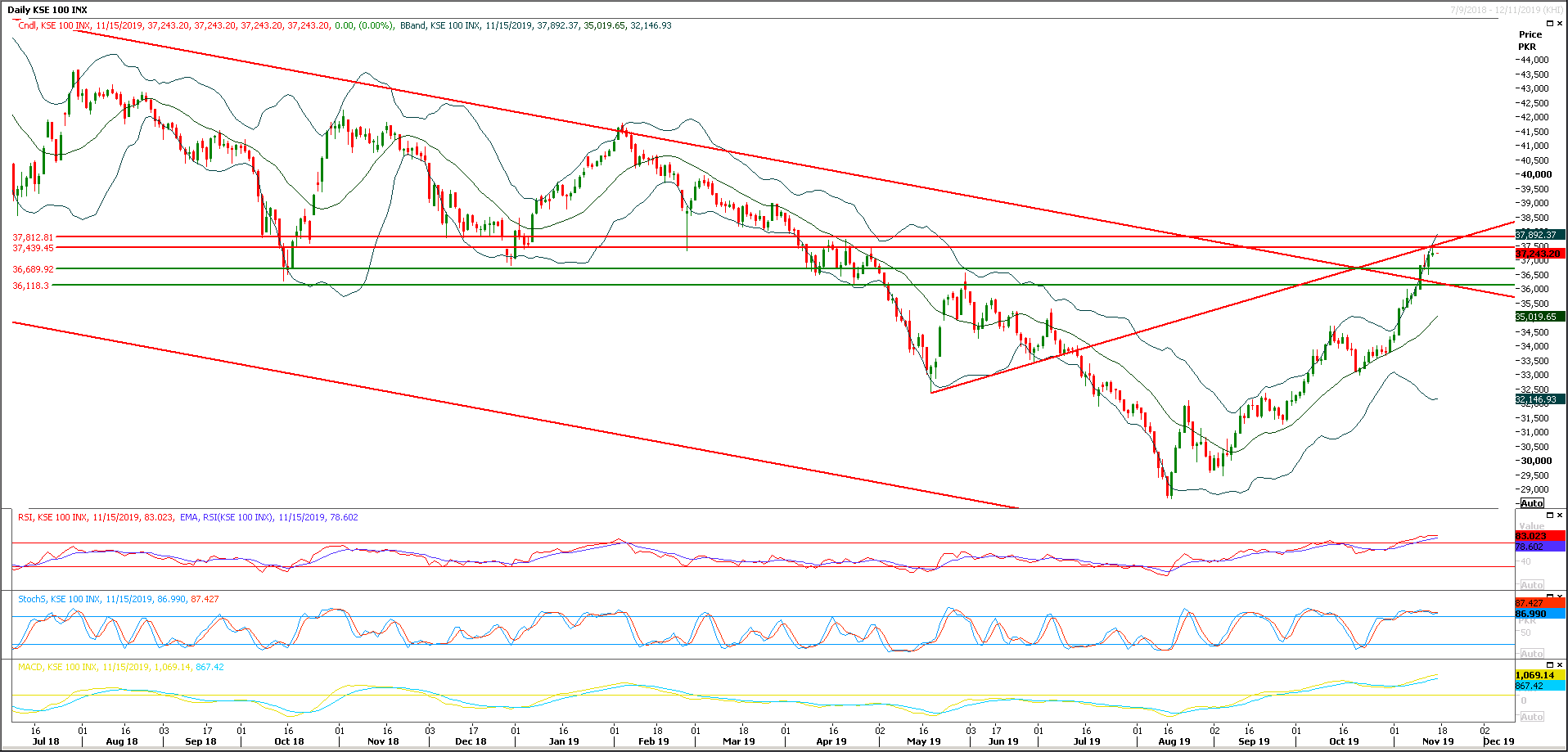Previous Session Recap
Trading volume at PSX floor increased by 60.94 million shares or 22.12% on DoD basis, whereas the benchmark KSE100 index opened at 37,166.96, posted a day high of 37,507.02 and a day low of 37,130.01 points during last trading session while session suspended at 37,243.20 points with net change of 76.24 points and net trading volume of 188.71 million shares. Daily trading volume of KSE100 listed companies increased by 14.05 million shares or 8.04% on DoD basis.
Foreign Investors remained in net selling positions of 7.41 million shares and net value of Foreign Inflow dropped by 0.11 million US Dollars. Categorically, Foreign Individual and Corporate Investors remained in net selling positions of 0.06 and 12.19 million shares but Overseas Pakistanis remained in net long positions of 4.84 million shares. While on the other side Local Individuals, Companies and Mutual Funds remained in net long positions of 67.68, 10.57 and 10.85 million shares but Banks Brokers and Insurance Companies remained in net selling positions of 13.03, 58.95 and 9.43 million shares respectively.
Analytical Review
Asian shares rise as Kudlow comments lift trade hopes
Asian stocks jumped on Friday, propelled by a record S&P 500 finish and White House comments suggesting Washington and Beijing were close to striking a trade deal, reviving hopes the tariff war may near an end. White House economic adviser Larry Kudlow said on Thursday that Washington was getting close to a trade agreement with China, providing a fillip to investor confidence. That helped to lift MSCI’s broadest index of Asia-Pacific shares outside Japan up 0.67%. Japan’s Nikkei added 0.76% and Australian shares gained 0.8%. Chinese blue-chip shares gained 0.06% shortly after the start of trade. Shane Oliver, chief economist at AMP Capital in Sydney, likened the market’s reaction to positive trade news to being in a relationship with an alcoholic, driven by entrenched hopes for recovery.
Treasury bills attract record foreign investment of $713m
Foreign investment in treasury bills reached a new high of $712.8 million in the first four months of this fiscal year. The recent State Bank of Pakistan data indicates investment in government-backed securities has become attractive for foreigners. The financial sector believes that foreign investors’ growing interest in government papers reflects their confidence in the economic reforms being implemented in the country. However, some researchers attribute this increased demand to the high yield of treasury bills. In the last auction of T-bills held on November 6, the cut-off yield for three and six-month securities were 13.28 per cent and 13.29pc, respectively.
Trade deficit shrinks 34pc to $7.77bn
The country’s trade deficit fell by 34 per cent in the first four months of current fiscal year led by a paltry growth in exports and a double digit decline in imports of non-essential products. The data showed trade deficit in the first four months dipped to $7.77 billion from $11.69bn over the corresponding period last year, reflecting a decline of $4.19bn or 33.52 per cent. The trade deficit has been on the declining trend in the ongoing fiscal year mainly due to government’s corrective measures to slow down imports in order to reduce pressures on foreign exchange reserves and slump in overall demand, data released by the Pakistan Bureau of Statistics (PBS) showed on Thursday.
Govt goes for another power tariff hike to secure IMF tranche
The government has decided to introduce another electricity tariff hike before the management and executive directors of the International Monetary Fund (IMF) take up for approval a recently concluded agreement between the Fund mission and Pakistani authorities to pave the way for disbursement of about $450 million. Under the decision, 10 distribution companies (Discos) of ex-Wapda have sought Rs17.2 billion additional revenue generation through an average price increase of about 18 paisa per unit. Once cleared by the National Electric Power Regulatory Authority (Nepra) later this month, the average electricity tariff would increase to about Rs13.69 per unit, excluding general sales tax and some other taxes and duties, from the current rate of Rs13.51 per unit.
Textile industry faces liquidity crunch
The textile industry on Thursday warned that due to non-payment of refunds worth around Rs80 billion, there was an acute liquidity crunch. Addressing a press conference, All Pakistan Textile Mills Association (Aptma) Chairman Amanullah Kassim regretted that time and again, the government had been committing to make timely payment of refunds but this never materialises. He said after removing five export-oriented sectors from zero rating from July 1, the government under pressure of International Monetary Fund imposed 17 per cent sales tax on exports on the assurance that refunds would be paid within 72 hours.
Asian stocks jumped on Friday, propelled by a record S&P 500 finish and White House comments suggesting Washington and Beijing were close to striking a trade deal, reviving hopes the tariff war may near an end. White House economic adviser Larry Kudlow said on Thursday that Washington was getting close to a trade agreement with China, providing a fillip to investor confidence. That helped to lift MSCI’s broadest index of Asia-Pacific shares outside Japan up 0.67%. Japan’s Nikkei added 0.76% and Australian shares gained 0.8%. Chinese blue-chip shares gained 0.06% shortly after the start of trade. Shane Oliver, chief economist at AMP Capital in Sydney, likened the market’s reaction to positive trade news to being in a relationship with an alcoholic, driven by entrenched hopes for recovery.
Foreign investment in treasury bills reached a new high of $712.8 million in the first four months of this fiscal year. The recent State Bank of Pakistan data indicates investment in government-backed securities has become attractive for foreigners. The financial sector believes that foreign investors’ growing interest in government papers reflects their confidence in the economic reforms being implemented in the country. However, some researchers attribute this increased demand to the high yield of treasury bills. In the last auction of T-bills held on November 6, the cut-off yield for three and six-month securities were 13.28 per cent and 13.29pc, respectively.
The country’s trade deficit fell by 34 per cent in the first four months of current fiscal year led by a paltry growth in exports and a double digit decline in imports of non-essential products. The data showed trade deficit in the first four months dipped to $7.77 billion from $11.69bn over the corresponding period last year, reflecting a decline of $4.19bn or 33.52 per cent. The trade deficit has been on the declining trend in the ongoing fiscal year mainly due to government’s corrective measures to slow down imports in order to reduce pressures on foreign exchange reserves and slump in overall demand, data released by the Pakistan Bureau of Statistics (PBS) showed on Thursday.
The government has decided to introduce another electricity tariff hike before the management and executive directors of the International Monetary Fund (IMF) take up for approval a recently concluded agreement between the Fund mission and Pakistani authorities to pave the way for disbursement of about $450 million. Under the decision, 10 distribution companies (Discos) of ex-Wapda have sought Rs17.2 billion additional revenue generation through an average price increase of about 18 paisa per unit. Once cleared by the National Electric Power Regulatory Authority (Nepra) later this month, the average electricity tariff would increase to about Rs13.69 per unit, excluding general sales tax and some other taxes and duties, from the current rate of Rs13.51 per unit.
The textile industry on Thursday warned that due to non-payment of refunds worth around Rs80 billion, there was an acute liquidity crunch. Addressing a press conference, All Pakistan Textile Mills Association (Aptma) Chairman Amanullah Kassim regretted that time and again, the government had been committing to make timely payment of refunds but this never materialises. He said after removing five export-oriented sectors from zero rating from July 1, the government under pressure of International Monetary Fund imposed 17 per cent sales tax on exports on the assurance that refunds would be paid within 72 hours.
Market is expected to remain volatile during current trading session.
Technical Analysis
The Benchmark KSE100 index had dishonored a hammer on daily chart during last trading session after getting support from a horizontal supportive region and now it's now expected that index would face some pressure from 37,465 points and 37,700 points. While on flip side supportive regions are standing at 36,800 and 36,500 points. It's recommended to start selling on strength and short positions with strict stop loss of 37,800 points because on this region index would face strong resistances on monthly chart. While an ascending trend line is also posting a crossover with a horizontal resistant region at 36,465 points and this region would try to react as a strong resistance for index therefore it's recommended to stay cautious and post trailing stop loss on existing long positions.
 To Open picture in original resolution right click image and then click open image in a new tab
To Open picture in original resolution right click image and then click open image in a new tab


0 Comments
No comments yet. Be the first to comment!
Please log in to leave a comment.